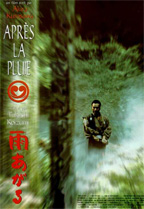

Ame agaru
Japan 1999
Genre:
Period Drama
Director:
Takashi Koizumi
Cast:
Akira Terao
Yoshiko Miyazaki
Shirô Mifune
Fumi Dan
Hidetaka Yoshioka
Hisashi Igawa
Mieko Harada
Takayuki Katô
Tatsuo Matsumura
Tatsuya Nakadai

After the Rain
aka Ame agaru
Story: The travelling samurai Ihei Misawa (Akira Terao) wanders through Japan with his wife Tayo (Yoshiko Miyazaki) and is searching
for a new task in life. He ends up at an inn since continueing rain doesn't allow him to cross a river. The people who have found shelter at the inn
have soon found a liking in him because of his generosity and kindness. When he also keeps two young hotheads of a local clan from killing one another
over nothing he is watched by Lord Nagai (Shirô Mifune) who is impressed by the extraordinary fighting skills he shows. Lord Nagai has become
curious and invites Ihei to his castle. There the samurai tells his story and how up to this day no ruler could hire him for long which is why he
is now wandering the country. Lord Nagai thus tells him that for quite some time already he is looking for someone who is worthy to be his new
master-of-arms. Ihei seems to be just the right person for this job, but soon even Lord Nagai has to realize why good-hearted Ihei doesn't find
a new master anywhere.
Review: The story of "After the Rain" is simple and yet moves the heart, it puts you in a good mood and also makes you reflect.
This shouldn't be a big surprise since the screenplay is written by Akira Kurosawa based on a short story by Shûgorô Yamamoto. Directing legend
Kurosawa died during post-production and so his long-term assisstant director Takashi Koizumi did get the chance to make his debut with this movie after
a french production company put the necessary money on the table. You can always make out Kurosawa's handwriting in "After the Rain", but apart from
that Koizumi also proves to be a director who has his own style in the making. However, there is one thing that he undoubtfully has in common with
his master. He shoots movies that have their very own pacing. The introduction is therefore looking somewhat unspectacular but the movie's strength comes
to the foreground later on.
A good-hearted samurai who is looking for work. Ihei's problem is just that he is too friendly. His concern to have injured his foe looks like
mockery in the eyes of the one beaten and so Ihei's kind-hearted character is often misunderstood. This is also because he is an exceptionally skilled
fighter. No one stands a chance against him. Yet this samurai isn't characterized by a blind trust in a code of honor but is also willing to fight
for money if he can help the people around him by that. For tradition-centered samurais this would be a disgrace but people love Ihei for that.
The samurai is also misunderstood by his wife, though, who is still hoping that he will find work but is supporting him under adverse conditions
as well.
The movie starts in an unusual way and shows in detailed pictures the life at the inn and an ample party. Only when the lord becomes interested in
Ihei the story starts to get some momentum. Still, "After the Rain", apart from a few little fight scenes, has an extemely slow pacing, which gives
the movie almost something meditative. As already stated this only proves to be a problem at the beginning. Yet, there is no doubt that
Kurosawa easily could have created more tension in a movie. Nonetheless, most of the time the film works out just fine which is also thanks
to the charismatic portrayal of Akira Terao. Sometimes you even get the impression that Ihea is a monk, that is just how amiably and sincerely he
treats the people around him, but deep within there is in fact also slumbering an excellent warrior.
Therefore, it doesn't come as a surprise that Ihei never considers to do anything different than being a samurai. Fighting is what he is really
good at. During a demonstration at Lord Nagai's castle he proves his ability as impressively as he does in a fight of life and death when he is
attacked at a nearby forest by a bunch of fighters. That is also where the handwriting of director Koizumi's master shines through. Nevertheless,
wielding the sword also serves Ihei as a means to find his inner balance. When he is disappointed by himself and the world and wants to find inner
peace again he looks for a quiet place and practices with his sword. His movements are meditative and the director captures them in all of their
tranquility in order to adequately depict his emotions.
Toshiro Mifune's son Shiro plays Lord Nagai with a refreshing screen presence that stands in a nice contrast to Terao's more introverted role,
and Yoshiko Miyazaki plays the charming wife of the samurai, who always gives him great support and thus is also responsible for Ihei's peace of
mind. Accordingly, the ending also turns out to be pretty reflective and positive in tone, even though it is at the same time rather open to
interpretations. Still, in "After the Rain" it isn't important to draft out the ending in detail. We have been granted a glimpse into the heart
of a sincere and good man and found every answer we could have searched for. A wonderful movie, which only downsides are its slow start and an
at times slightly naive tone.

Disclaimer





















